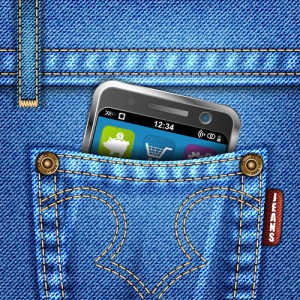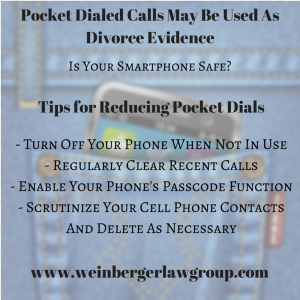Court Rules Pocket Dialed Phone Calls May Be Fair Game For Divorce Evidence
 Almost everyone has been on either the calling or receiving end of a pocket dial (aka “butt dial”), that annoying habit cell phones have of accidentally auto-dialing when placed in a back pocket. Getting divorced? Here’s extra motivation to keep your phone safe: if you accidentally pocket dial your spouse, he or she may be able to use information gleaned from listening in as evidence against you in your divorce case, according to a recent federal ruling.
Almost everyone has been on either the calling or receiving end of a pocket dial (aka “butt dial”), that annoying habit cell phones have of accidentally auto-dialing when placed in a back pocket. Getting divorced? Here’s extra motivation to keep your phone safe: if you accidentally pocket dial your spouse, he or she may be able to use information gleaned from listening in as evidence against you in your divorce case, according to a recent federal ruling.
The case in question involved a 91-minute pocket dial between James Huff, former chairman of the board of a regional airport in Kentucky and Carol Spaw, the assistant to the board’s then-CEO Candace McGraw. According to court documents submitted to the U.S. Court of Appeals for the Sixth Circuit in Kentucky, Huff accidentally called Spaw while he was visiting Italy in 2013. Without realizing Spaw was connected on the line, Huff had a private in-person conversation with another board member about possibly replacing McGraw. Spaw took notes and recorded a portion of the discussion on her iPhone. She also listened in on an in-person conversation that Huff later had with his wife during another accidental call.
When these incidents came to light, Huff sued Spaw, charging that she had violated a federal wiretapping act that makes the intentional interception of electronic or oral communications illegal (federal and state wiretapping laws are often invoked during cases involving spousal spying). After a district court ruled in favor of Shaw, Huff appealed to the Sixth Circuit federal court. In its recent ruling, the federal court agreed that listening in on pocket dialed calls is fair game for gathering evidence.

What about personal privacy? In his decision for the Sixth Circuit court, Judge Danny Boggs wrote that any person, in any situation, who “fails to take simple precautions to prevent such exposure . . . does not have a reasonable expectation of privacy.”
To illustrate his point, Boggs compared pocket-dialing to someone accidentally leaving their windows uncovered. “Under the plain-view doctrine, if a homeowner neglects to cover a window with drapes, he would lose his reasonable expectation of privacy with respect to a viewer looking into the window from outside of his property … the doctrine applies to auditory as well as visual information,” he wrote.
What does this mean for your divorce? The federal court ruling opens the door for pocket dialed evidence to be introduced in any type of court case, including divorce cases, where other forms of smartphone evidence are already commonplace.
The ruling also means, of course, that it is important to prevent your phone from pocket dialing anyone, especially your former spouse. While no system can keep phones 1oo percent “butt dial-free,” helpful measures to reduce risk for accidental calls include:
– Turn your phone off when not in use.
– Clear recent calls from your phone on a regular basis. When phones pocket dial, they tend to dial numbers that were among the last called.
– Download a call confirmation app on your phone that prompts you to verify that you really want to place the call before your phone dials.
– Enable the passcode function on your phone (found on most smartphones). This prevents any use of the phone without first entering a four-digit string of numbers.
– Scrutinize your cell phone contacts to make sure these are people you know and trust.
– Remove your former spouse from your cell phone contacts. While typically not an advisable tip for divorced or separated spouses who are co-parenting, if you don’t have kids, write your spouse’s number written down on a piece of paper you keep in your wallet or purse and use as needed when a call is necessary.
Has your spouse recovered evidence through an inadvertent pocket dial? Are you concerned about divorce evidence obtained through other means? Our attorneys can help. For all your divorce needs, please contact us to schedule your initial consultation.

